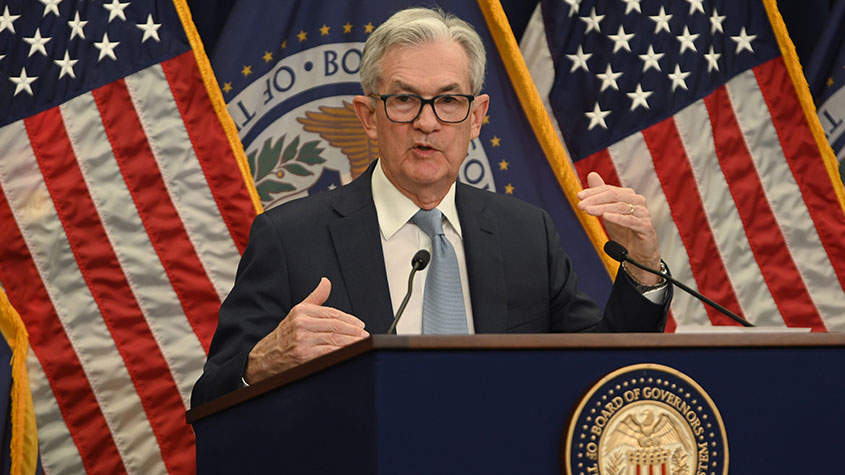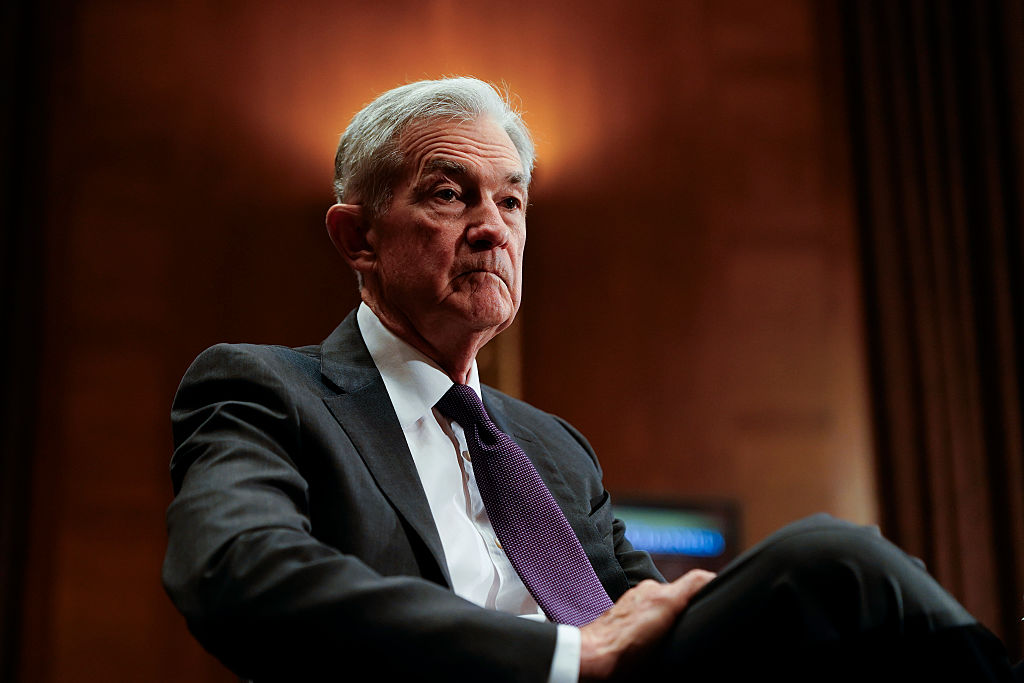Federal Reserve raises interest rates by 0.5%
The latest hike by the Federal Reserve takes the US benchmark rate to 4.25% - 4.5%.


Get the latest financial news, insights and expert analysis from our award-winning MoneyWeek team, to help you understand what really matters when it comes to your finances.
You are now subscribed
Your newsletter sign-up was successful
Want to add more newsletters?

Twice daily
MoneyWeek
Get the latest financial news, insights and expert analysis from our award-winning MoneyWeek team, to help you understand what really matters when it comes to your finances.

Four times a week
Look After My Bills
Sign up to our free money-saving newsletter, filled with the latest news and expert advice to help you find the best tips and deals for managing your bills. Start saving today!
The US Federal Reserve raised interest rates by 0.5%, taking the base rate to a 15-year high as part of its attempts to control rising inflation.
The benchmark interest rate now sits at a range of between 4.25% to 4.5%.
However, it looks as if the central bank is going to slow the pace of rate hikes going forward.
MoneyWeek
Subscribe to MoneyWeek today and get your first six magazine issues absolutely FREE

Sign up to Money Morning
Don't miss the latest investment and personal finances news, market analysis, plus money-saving tips with our free twice-daily newsletter
Don't miss the latest investment and personal finances news, market analysis, plus money-saving tips with our free twice-daily newsletter
After announcing the rate change, Jerome Powell, chair of the Federal Reserve, said “the appropriate thing to do now is to move to a slower pace” and see how the economy responds to higher interest rates.
He also said the Fed expects inflation to remain high into next year. The US Bureau of Labor Statistics reported earlier this year that prices have risen by 7.1% from last November, increasing 0.1% from October.
The Fed’s interest rate announcement preceded the BoE’s interest rate hike of 0.5% as both central banks face the difficult task of controlling rising inflation without causing too much harm to their respective economies.
Why is the Federal Reserve raising interest rates?
While November’s 7.1% figure is an improvement from June’s 9.1% rate of inflation, which was the highest in 40 years, it’s still three times higher than the Fed’s target of 2%.
The Federal Reserve has been increasing rates at a fast pace as it looks to control inflation.
The easing figures in October were mostly due to falling gas prices. However, the cost of healthcare, rent, and dining out remains high with rent driving the cost of living up the most.
Increased interest rates make the cost of borrowing higher, which in turn encourages saving.
So in theory, they should help bring prices down as people spend less and businesses compete for custom by decreasing prices. But because they discourage spending, they also slow down the economy.
“Inflation has been falling since the summer when the rate peaked at the highest level in over 40 years, 9.1%, compared to yesterday’s 7.1% reading,” says Dan Boardman-Weston, CEO and chief investment officer at BRI Wealth Management.
“This seems to have given the Fed confidence to slow the pace of interest rate increases, even though rates are likely to rise to a higher level and remain there for longer than expected a few months ago.”
But Powell added that while the October and November figures were encouraging, “it will take substantially more evidence to give confidence inflation is on a sustained downward path”.
What do rising interest rates mean for you?
By hiking interest rates the Fed is making it more expensive to borrow money, which should reduce demand for goods and services.
For example, 30-year mortgage rates have spiked to 6.3% over the past year, pushing up the cost of buying a home. As a result, property prices have started to fall as buyers reconsider their options.
Still, with the Fed now expected to slow the pace of rate hikes going forward, borrowers could see rates fall as the market settles into the new normal. Indeed, the average 30-year mortgage rate hit a 20-year high of 7.08% in November, but, as noted above, the rate has now dropped back to 6.3%.
Unfortunately, it does not look as if the central bank will be cutting rates any time soon, suggesting the outlook for equities is going to remain uncertain.
Both the S&P 500 and the Nasdaq saw losses following the Fed’s decision, closing 0.60% and 0.80% lower respectively.
“We expect that higher rates will subdue economic activity in 2023 and that this will lead to corporate profits falling and equities remaining under some pressure,” says Boardman-Weston.
“It’s become clear this year that the Fed is intent on crushing inflation and future expectations of inflation. The higher interest rate environment required to tame inflation comes at the cost of economic growth, which likely comes at the cost of lower stock markets.”
Get the latest financial news, insights and expert analysis from our award-winning MoneyWeek team, to help you understand what really matters when it comes to your finances.

Rupert is the former deputy digital editor of MoneyWeek. He's an active investor and has always been fascinated by the world of business and investing. His style has been heavily influenced by US investors Warren Buffett and Philip Carret. He is always looking for high-quality growth opportunities trading at a reasonable price, preferring cash generative businesses with strong balance sheets over blue-sky growth stocks.
Rupert has written for many UK and international publications including the Motley Fool, Gurufocus and ValueWalk, aimed at a range of readers; from the first timers to experienced high-net-worth individuals. Rupert has also founded and managed several businesses, including the New York-based hedge fund newsletter, Hidden Value Stocks. He has written over 20 ebooks and appeared as an expert commentator on the BBC World Service.
-
 What is a care fees annuity and how much does it cost?
What is a care fees annuity and how much does it cost?How we will be cared for in our later years – and how much we are willing to pay for it – are conversations best had as early as possible. One option to cover the cost is a care fees annuity. We look at the pros and cons.
-
 How to navigate the inheritance tax paperwork maze in nine clear steps
How to navigate the inheritance tax paperwork maze in nine clear stepsFamilies who cope best with inheritance tax (IHT) paperwork are those who plan ahead, say experts. We look at all documents you need to gather, regardless of whether you have an IHT bill to pay.
-
 How a dovish Federal Reserve could affect you
How a dovish Federal Reserve could affect youTrump’s pick for the US Federal Reserve is not so much of a yes-man as his rival, but interest rates will still come down quickly, says Cris Sholto Heaton
-
 New Federal Reserve chair Kevin Warsh has his work cut out
New Federal Reserve chair Kevin Warsh has his work cut outOpinion Kevin Warsh must make it clear that he, not Trump, is in charge at the Fed. If he doesn't, the US dollar and Treasury bills sell-off will start all over again
-
 'Investors should brace for Trump’s great inflation'
'Investors should brace for Trump’s great inflation'Opinion Donald Trump's actions against Federal Reserve chair Jerome Powell will likely stoke rising prices. Investors should prepare for the worst, says Matthew Lynn
-
 'Governments are launching an assault on the independence of central banks'
'Governments are launching an assault on the independence of central banks'Opinion Say goodbye to the era of central bank orthodoxy and hello to the new era of central bank dependency, says Jeremy McKeown
-
 Will Donald Trump sack Jerome Powell, the Federal Reserve chief?
Will Donald Trump sack Jerome Powell, the Federal Reserve chief?It seems clear that Trump would like to sack Jerome Powell if he could only find a constitutional cause. Why, and what would it mean for financial markets?
-
 Can Donald Trump fire Jay Powell – and what do his threats mean for investors?
Can Donald Trump fire Jay Powell – and what do his threats mean for investors?Donald Trump has been vocal in his criticism of Jerome "Jay" Powell, chairman of the Federal Reserve. What do his threats to fire him mean for markets and investors?
-
 Do we need central banks, or is it time to privatise money?
Do we need central banks, or is it time to privatise money?Analysis Free banking is one alternative to central banks, but would switching to a radical new system be worth the risk?
-
 Will turmoil in the Middle East trigger inflation?
Will turmoil in the Middle East trigger inflation?The risk of an escalating Middle East crisis continues to rise. Markets appear to be dismissing the prospect. Here's how investors can protect themselves.